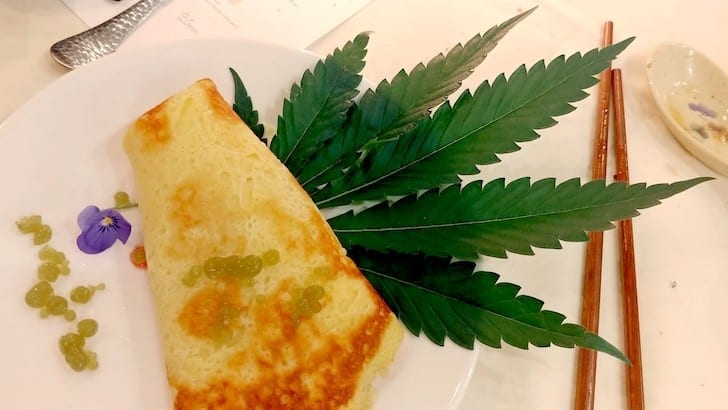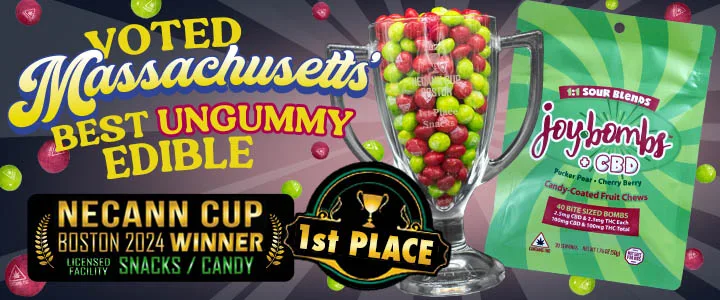
Restaurants that host popular marijuana-infused food events were put “on notice” by the Boston Licensing Board (BLB), which is threatening any venue that holds THC tastings with losing their licenses.
The crackdown comes as the state’s Cannabis Control Commission (CCC) overseeing marijuana considers a pilot program for infused event licenses. In Boston, groups that organize such gatherings say they have tried to work with the BLB and have received conflicting information, and that city officials need to recognize the business of serving legal weed.
“We are getting approached by venues who want to host events,” said Sam Kanter, the owner and operator of cannabis dining service Dinner at Mary’s. “They’re going to happen, you’re not going to stop them from happening.
“People want to get involved, it’s time for the city to let us do it.”
While voters legalized recreational marijuana in 2016, on Beacon Hill, the CCC is still writing regulations regarding “social consumption.” Meanwhile, at the federal level, the Food and Drug Administration has not cleared any cannabis derivatives as food additives, meaning that edibles are not legally allowed on the market.
None of which has stopped people from using CBD or THC in their own cooking. Indeed, several groups have sprung up to organize events where chefs prepare infused meals at gatherings both in privates spaces and at local restaurants. Kanter said her company is one of the groups that prompted an advisory that the BLB released last week, warning restaurants and bars about hosting the pot parties.
City officials said both Dinner at Mary’s and another cannabis dining service, Eat Sacrilicious, were particularly put on notice, and that they found out about the dinners after a member of the public complained to the board; the BLB, they added, told Kanter in writing the events were illegal in February and April.
Any infused food event at a licensed premise—whether or not it is open to the public, and whether alcohol is consumed or not—is illegal, the BLB advisory states, and violators “will be subject to disciplinary action” including a suspension or revocation of their license. The advisory also says while it is legal to give marijuana as a gift, doing so in conjunction with sales of another item, including tickets or membership fees to attend an event, is also illegal.
“All holders of a Common Victualler or Alcoholic Beverages License issued by the board are formally on notice by the board of the illegality of such an event,” the advisory reads. “Any business which hosts such an event at its Licensed Premise does so at the peril of any license issued by the board.”
At the state level, the CCC will discuss pilot programs for cannabis cafes and social consumption host licenses, aka event licenses, at its meeting this Thursday, according to commissioner Shaleen Title. Both programs are being recommended by the CCC’s working group on social consumption.
“A primary goal of the pilot program is to promote and encourage the groups that have thus far been unable to meaningfully participate in the legal cannabis industry,” Title said in a statement. “Another goal of the pilot program is to start small, with a limited number of participating municipalities, in order to have the opportunity to closely monitor any unforeseen challenges and ensure that in wider implementation.”
But Boston won’t be part of any pilot, a spokesman for Mayor Marty Walsh said.
“The city of Boston is focused on improving the marijuana licensing process to ensure equity applicants have access to the opportunities of this new industry,” said Samantha Ormsby, a spokeswoman for Walsh. “While we are not participating in the pilot program for cannabis cafes or events, we are reviewing how services such as cafes and marijuana delivery will impact the city’s marijuana landscape.”
Kanter said the two boards should be on the same page when it comes to events licensing: “The separation of the CCC and the licensing board confuses me. It doesn’t feel like these two teams are working together, which makes it that much more challenging for us in the space.”
And Kanter said the licensing board was making business difficult in other ways. The advisory also claims there are “a number of companies organizing such events and providing misinformation regarding the legality,” which Kanter blasted as a mischaracterization of her business.
“It’s frustrating the advisory said that—it’s insinuating we’re purposefully providing incorrect information to get venues to host,” Kanter said. “We’re providing all the information that we have. … When we came on the radar, they said, ‘We’re not shutting you down, but do certain things—get a catering firm, do private events.’ They gave us a list [of things] to do and we did them, and as soon as we did those things, they came up with another problem.”
Dinner at Mary’s has advertised numerous infused meals at bars this year, including on April 20 at Shojo. Euphoric Foods, an infused-meals catering company, organized a prix fixe dinner at Trade with Chef Jody Adams in March that was advertised in local media.
Chef David Ferragamo, who runs Euphoric Food, said navigating the landscape of infused foods is difficult, while the advisory is making things even more complicated.
“There’s not a lot of problem-solving, it’s more like problems being surfaced,” Ferragamo said of the advisory. “It made me nervous—‘Oh no, are they cracking down? Should I pull back?’ But we’re not doing anything illegal.”
Ferragamo added: “It’s hard to work within that space, it’s all gray areas. Now that this [advisory] is out, things have to be fine-tuned … We want to develop a good relationship with the [BLB], we’re not trying to do anything wrong, we’re trying to work legally in the space we’re allowed.”
While Ferragamo hopes to eventually run a restaurant serving infused meals, he said the March event at Trade was the only meal that he has organized in a licensed venue. His normal method is to host meals for private gatherings where he is paid for his abilities as a chef—the hosts purchase any cannabis that’s used, but at no point is marijuana sold outside of a dispensary.
Kanter said private events are one way to prepare pot-infused meals, but restaurants provide a more comfortable venue for people who are curious. She framed her organization’s meals as a way for those who may be unfamiliar with edibles and infused meals to learn about the concept in a friendly environment.
“We try to put on a specific caliber of event, higher end, and make the guests as comfortable as possible,” Kanter said. “Being in someone’s home [who] you don’t know is not comfortable. A restaurant is a comfortable space, and they have a kitchen to serve the safest food.”
While Kanter is waiting to meet with city officials further and is anticipating more discussion of the CCC’s potential pilot program, she has canceled a planned event for this weekend. City and state officials, she said, need to come up with a framework that treats cannabis like any other substance.
“The time is now,” Kanter said. “It’s been two and a half years [since] recreational legal cannabis [was approved by voters], but we don’t have the resources to show the public how to safely use cannabis.
“It’s one thing if they’re not cracking down on it and looking the other way. They’re trying to stop what we’re doing, but not giving us other options.”


























